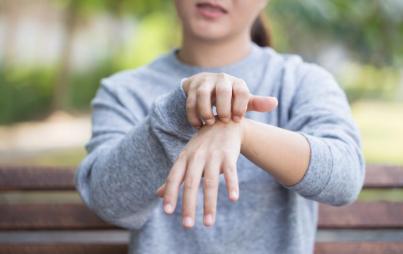
Photo by henri meilhac on Unsplash
Recently, I dropped a significant amount of weight in a short time. The response from my friends and family has been enthusiastically positive. “You look great! What have you been doing?” So, I tell them exactly how I’ve achieved this incredible weight loss.
I’ve been sick, Shelia. Really fucking sick. True, I can now wear the same dresses I wore in college (because I’m cheap and chronically ill), but that’s not cause for celebration. Even if I go into embarrassing detail about my two-decade battle with IBS and fun new food sensitives, the focus remains on my weight.
I’ve had multiple people tell me, “I wish I had something like that to keep me in shape.”
The first time it happened, I figured the person either misspoke or had deep-seated body issues. The second time it happened, I lost a little faith in humanity.
I’m not in shape. I’m less of myself. I don’t exercise as I once did. I drink crap like soda FOR the calories. I avoid making plans with friends because I’ll probably break them. If I do attend a party, I’m the 100% sober chick not eating anything. Still, the only measure that seems to matter is the number on the scale.
Even people with enough empathy to understand that weight loss due to severe, constant GI distress is not something they want, continue to compliment my appearance. “Well, at least you look fantastic!”
I’m not exactly sure how to take this. Is being thin a consolation prize for being sick? I get that these compliments come from a good place. (Plus, I’m sure it’s awkward as hell to say something nice to someone only to find out it’s not). Had I taken up ultra-running or a fad diet, I’d probably be pleased someone noticed the results of my hard work and dedication.
If I'm 100% truthful, I‘ve dipped two pounds under my “ideal” weight — that number on the scale where I look fit, not scrawny.
My cheekbones are pronounced but not skeletal. My stomach is flat. My boobs deflate from slightly comical DDs on my small frame to perky Cs. This “ideal weight” is something many women have, though as someone who tries to practice body positivity, I don’t often admit. The last time I weighted this, I was running daily and in the best shape of my life. I had crept further and further from that number in my thirties, but I still kept it in mind. Then, I got sick and as the weeks and then months passed, I lost more and more pounds until one day, I hit my “magical number.” People around me noticed and thought it merited compliments. So yes, it’s a little confusing.
You Might Also Like: We Are A Culture Obsessed With Productivity — And It's Literally Killing Us
Even worse, my young daughters hear all this positive feedback. They’ve, unfortunately, also seen the backstory: The family dinners where mom doesn’t eat, the hours spent in the bathroom or in bed, my failures in the kitchen as I try to find food I can stomach. There are also the things my girls don’t see: The grocery bills averaging $50 to $100 more a week because preparing dairy-free, peanut-free food from scratch (which is the only way to ensure you know all the ingredients) typically costs more than highly-processed foods with good old cow’s milk. They don’t see the countless google searches I’ve done on Crohn’s, Ulcerative Colitis or Colorectal cancer as I wait three months (three fucking months) for the tests required to eliminate these conditions.
I stopped weighing myself. It’s too depressing.
At this point, I would trade anyone’s cellulite for the ability to eat without fear. I keep thinking of a line in T.S. Elliot’s The Love Song of J. Alfred Prufrock: “Do I dare to eat a peach?” When I read the poem in college, I laughed out loud. Was he afraid to drip juice on his shirt? Who’s afraid to eat a peach? Twenty years later, I can answer that question: Me. Eating has become a game of Russian roulette I often lose.
When people look at me, they see a svelte size four, bordering on a two. They don’t see the bruises from multiple blood tests, the hours of doctor appointments, or the fear that maybe this flare isn’t IBS. Maybe it’s something far worse.
I’m an adult and the feedback I’m receiving confuses me. I can only imagine what my daughters must think. I fear they’re learning that being thin is better than being healthy. I’m afraid I might be learning this too. When I finally discover what I can and cannot eat, will I regret if my weight creeps above my “ideal”? I hope not. But this experience has altered my relationship with food in a way I never foresaw.
There are many terrible reasons for weight loss that shouldn’t be celebrated. Unless someone has shared with you their dedication to a new workout routine or diet, don’t comment on their body. Better yet, don’t comment on someone’s body unless you know more of their story than how they look. And if someone you know is trying to lose weight and succeeds, focus your compliments on their dedication to their health, not their scale. Often that “magic number” isn’t the measurement we need.
Related:
-
I Quit My Job Because of Chronic Illness
-
That Time My Eating Disorder Broke My Leg
-
How An Invisible Illness Gives Me Thin Privilege








